 W
WCharles Ashton was a Welsh literary historian and bibliophile, born in Llawr-y-glyn, Montgomeryshire (Powys).
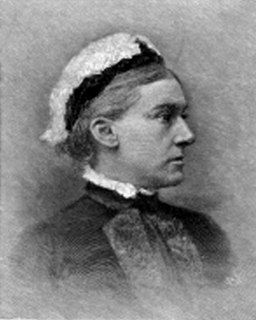 W
WRhoda Broughton was a Welsh novelist and short story writer. Her early novels earned her a reputation for sensationalism, which meant her later, stronger work tended to be neglected by critics, although she was described as a queen of the circulating libraries.
 W
WHans Busk the younger DL was one of the originators of the "Volunteers".
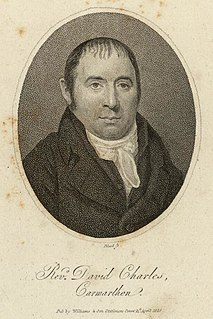 W
WDavid Charles, was a Welsh hymn-writer.
 W
WEdwin Davies was a Welsh publisher and editor. Shortly after he was born, his family moved to Brecon, where he grew up. On completing his elementary education, he began a seven-year apprenticeship to a printing and publishing business. He was later employed as the business foreman, before acquiring the business and becoming its manager-editor, editing and publishing the newspaper, Brecon and Radnor County Times, for the next twelve years. During this time he campaigned for the Disestablishment of the Church in Wales, which was achieved in 1914, and endorsed Liberal views.
 W
WEvan Thomas Davies, also known by the pseudonym "Dyfrig", was a Welsh priest. After completing his education at the school in Ystrad Meurig he moved to study at St David's College, Lampeter, graduating in 1869. He then spent the next year teaching, at Greenock, before, in 1870 being ordained Deacon, and, in 1871, ordained Priest. For a while he was appointed Curate of Llanwynno, and later of Betws, Glamorganshire. In 1875, he moved to take up an appointment at St David's Welsh Church, Brownlow Hill, Liverpool, before, in 1882, becoming vicar of Aberdyfi, and then, in 1890, of Pwllheli. In 1906 he was appointed Vicar of Llanfihangel Ysgeifiog in Anglesey, where he remained until he retired in 1913. He also served as Rural Dean of Llŷn, and as Residentiary Canon of Bangor Cathedral.
 W
WJohn Davies was a Welsh Methodist minister. He was born in Llandovery, and as a young boy attended a school in Myddfai for a while before moving to attend classes at Hanover School, near Abergavenny. In 1842, he began a period of study at Brecon College, following which, as an ordained minister, he held appointments at; Llanelly, Brecknock (1846), Aberaman (1854), Mount Stuart, Cardiff (1863), and Hannah Street, Cardiff (1868–74).
 W
WJohn Davies was a Welsh Calvinistic Methodist minister, preacher and writer.
 W
WJohn Gwynoro Davies was a Welsh Methodist minister. His father was minister Evan Davies. He was born in Llanpumpsaint, Carmarthenshire, and attended a local school, where he became a pupil-teacher. At just 20 years of age he was appointed headmaster of Dinas school, Rhondda. A few years later he decided to enter the Calvinistic Methodist ministry, and in 1877 entered Aberystwyth University College. He later moved to North Wales to study at Bala College. In 1887 he was appointed minister of Caersalem, Barmouth, and remained there until his death in 1935.
 W
WMary Davies, also known as Mair Eifion, was a Welsh poet writing in the Welsh language.
 W
WRev Dr Gwilym Arthur Edwards MA, DD was a Welsh Presbyterian minister and writer on theological topics. He was Principal of the United Theological College Aberystwyth from 1939 to 1949.
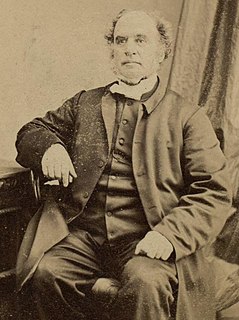 W
WRoger Edwards D.D. was a Welsh Calvinistic Methodist, who later became prominent in Wales as a press editor and publisher.
 W
WJohn Elias was a Christian preacher in Wales in the first half of the 19th century, as part of the Welsh Methodist revival. His preaching was noted as being exceptionally powerful, "as if talking fire down from heaven". On one occasion it is said he preached to a crowd of 10,000 people. He was a strict High-Calvinist who believed in the literal truth of the Bible. At one stage he argued strongly for the doctrine of election. He came to be known as Y Pab Methodistaidd in Welsh because of his forthright views. Despite his wide interests, he was a religious conservative who opposed all forms of political Radicalism as well as the assertion, popular at the time amongst Nonconformists in Wales, that "the voice of the people was the voice of God".
 W
WRobert Ellis, professionally known by his bardic name Cynddelw, was a Welsh language poet, editor, and lexicographer, born at Tyn y Meini, Bryndreiniog, Pen-y-Bont-Fawr in the old county of Montgomeryshire, Mid Wales.
 W
WGeorge Edward Luckman Gauntlett was a teacher of English and educator in Japan.
 W
WIsabella Gifford (1825–1891) was a Welsh-born botanist. In 1848, she published The Marine Botanist, a book which focuses on algology. Some of her specimens are in the Ulster Museum.
 W
WDavid Griffiths, was a Welsh Christian missionary and translator in Madagascar. He translated the Bible and other books into the Malagasy language. The Malagasy Bible of 1835 was among the first Bibles to be printed in an African language.
 W
WJoseph Harris was a Welsh Baptist minister, author, and journal editor. A Welsh language poet, he took the Biblical name of Gomer as his bardic name. On 1 January 1814 he launched the first Welsh-language weekly Seren Gomer in Swansea. Gomer was born on a farm in Wolf's Castle, Pembrokeshire, where a plaque was unveiled in his memory, making the 200th anniversary of the launch of Seren Gomer. Gomer himself became a preacher during the religious revival of 1795. He married Martha Symons, and took on Back Street chapel. One of his best-known works, Cofiant Ieuan Ddu, was a biography of his son, John Ryland Harris, who worked as a typesetter for his father's printing press and died at the age of twenty.
 W
WHugh Hughes (1790?–1863) was a Welsh painter, engraver and writer.
 W
WJohn Jones, commonly known by his bardic name of Ioan Tegid or simply Tegid, was a Welsh clergyman and writer.
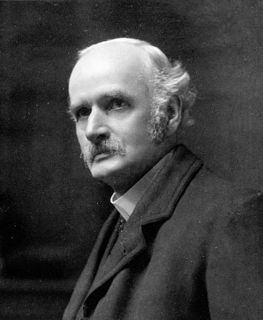 W
WSir Henry Jones, was a Welsh philosopher and academic.
 W
WRobert Isaac Jones, also known under his bardic name Alltud Eifion, was a Welsh pharmacist, writer, and printer.
 W
WJohn Jones, better known under his nom de plume Myrddin Fardd, was a Welsh writer and antiquarian scholar born at Tan-y-Ffordd in the village of Mynytho, Llangian, Caernarfonshire. He was a translator and a collector of folklore.
 W
WDaniel Owen was a Welsh novelist, generally regarded as the foremost Welsh-language novelist of the 19th century, and as the first significant novelist to write in Welsh.
 W
WMary Catherine Pendrill Llewelyn, née Mary Catherine Rhys was a Welsh writer and translator.
 W
WThomas Rees was a Welsh Congregational minister and a historian of nonconformism. He was twice elected chairman of the Union of Welsh Independents.
 W
WDavid Richards, better-known by his bardic name Dafydd Ionawr, was a Welsh-language poet, born at Glanyrafon near Bryn-crug in the parish of Tywyn in Merionethshire, north-west Wales.
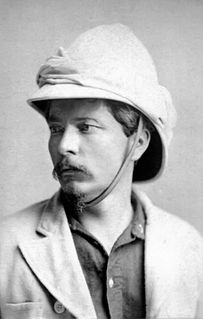 W
WSir Henry Morton Stanley was a Welsh-American journalist, explorer, soldier, colonial administrator, author and politician who was famous for his exploration of central Africa and his search for missionary and explorer David Livingstone, whom he later claimed to have greeted with the now-famous line: "Dr Livingstone, I presume?". He is mainly known for his search for the source of the Nile, work he undertook as an agent of King Leopold II of Belgium, which enabled the occupation of the Congo Basin region, and for his command of the Emin Pasha Relief Expedition. He was knighted in 1899.
 W
WElijah Waring was an Anglo-Welsh writer. He founded an English-language periodical in Swansea.
 W
WDavid Williams was a Welsh philosopher of the Enlightenment period. He was an ordained minister, theologian and political polemicist, and was the founder in 1788 of the Royal Literary Fund, of which he had been a proponent since 1773.
 W
WMorris Williams, was a Welsh clergyman and writer, commonly differentiated by his bardic name of Nicander.
 W
WRobert Williams, usually referred to by his bardic name Trebor Mai, was a Welsh language poet, born at Ty'n-yr-ardd near Llanrhychwyn, near Llanrwst, in the old county of Caernarfonshire, the son of a tailor. He was educated at a local Llanrhychwyn school and for a period attended the free school at Llanrwst. Around 1843, he moved with his family to Llanrwst and he applied himself to his father's craft. After he married on 13 October 1854 he commenced business as a tailor himself in Llanrwst, and remained there for the rest of his life. He died in 1877, aged 47.
 W
WWilliam Williams FRSE PRCVS (1832–1900) was a Welsh veterinary surgeon who served as principal of the Dick Veterinary College in Edinburgh (1867–73) and as president of the Royal College of Veterinary Surgeons (1879). He was the founder and principal of the rival New Veterinary College (1873–1904), originally housed in Gayfield House, Edinburgh.